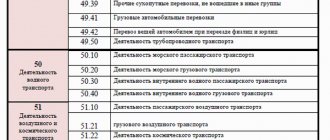VAT on international transport of goods
Services for the international transportation of goods by road, rail, air and water transport are subject to VAT at a rate of 0% (subclause 2.1, clause 1, article 164 of the Tax Code of the Russian Federation). In this case, the point of departure or destination must be outside of Russia. This group also includes:
- provision by Russian companies (entrepreneurs) of their own or leased railway rolling stock for the international transportation of goods;
- transport and forwarding services provided on the basis of a transport expedition agreement for international transportation.
These services are subject to a zero rate for transportation across the territory of Russia from the place of arrival of goods to the station of their destination.
Conditions for applying the zero rate
In this case, international transportation means the transportation of goods by air, sea, river vessels, mixed navigation vessels, rail and road transport, in which the point of departure or destination of the goods is located outside of Russia.
If, for example, a Russian company provides similar services for the road transportation of cargo from a Russian port to a destination also located in our country, then such transportation is subject to VAT at the generally established rate of 18%.
When providing international transportation services, all persons involved in the provision of these services have the right to apply a zero VAT rate.
Please note: if transport and forwarding services are not provided on the basis of a transport expedition agreement and are not related to the international transportation of goods, then they are taxed at the generally established VAT rate of 18%, as prescribed by paragraph 3 of Article 164 of the Tax Code. The Federal Tax Service of Russia noted this in a letter dated June 14, 2016 No. SD-4-3/ [email protected]
Services related to freight forwarding
A zero VAT rate applies to transport and forwarding services provided by Russian organizations on the basis of a transport expedition agreement for the international transportation of goods between points of departure and destination, one of which is located on the territory of the Russian Federation and the other outside its borders.
Under a transport expedition agreement, one party (the forwarder) undertakes, for a fee and at the expense of the other party (the client - the shipper or consignee), to perform or organize the performance of services related to the transportation of goods (clause 1 of Article 801 of the Civil Code of the Russian Federation).
According to pod. 2.1 clause 1 art. 164 of the Tax Code of the Russian Federation, transport and forwarding services include:
- participation in negotiations on concluding contracts for the purchase and sale of goods;
- registration of documents, acceptance and delivery of cargo;
- import and export of goods, loading, unloading and storage services;
- information Services;
- preparation and additional equipment of vehicles;
- services for organizing cargo insurance, payment and financial services;
- services for customs clearance of goods and vehicles;
- development and coordination of technical conditions for loading and securing cargo;
- search for cargo after the delivery period has expired;
- control over compliance with complete shipment of equipment;
- re-labeling of cargo, maintenance and repair of universal shipper containers;
- servicing refrigerated containers and storing cargo in warehouses and open areas of the forwarder.
How to confirm zero rate
When providing services subject to VAT at a zero rate, the taxpayer is required to submit documents to the tax authorities confirming the legality of applying this rate. The list of documents is established in clause 3.1 of Art. 165 Tax Code of the Russian Federation. So, it includes:
- a contract (copy of a contract) of a taxpayer with a foreign or Russian person for the provision of specified services;
- copies of transport, shipping and (or) other documents confirming the export of goods outside the Russian Federation (import of goods into the Russian Federation).
Documents confirming the import/export of goods outside the Russian Federation have their own characteristics depending on the specific vehicle used for transportation. For example, bill of lading, CMR waybill, air waybill or combination waybill.
Please note that transport and shipping documents must bear the border customs mark “Goods Exported”. If the goods were exported through the territories of the EAEU member states where customs control has been abolished (Belarus, Armenia, Kyrgyzstan or Kazakhstan), then on the transport documents it is sufficient to indicate the Russian customs office that carried out customs operations with the goods.
Let us remind you that the deadline for submitting documents is 180 calendar days. But the moment from which this period is calculated is established for each specific case separately. For example, for the international transport of goods, this is the date when customs officers mark the transport documents.
Application of a 0% rate on transport services
In accordance with paragraph 1 of Art. 164 of the Tax Code of the Russian Federation, sellers apply VAT on transport services using a 0% rate when carrying out:
- international transportation of goods with a point of departure/destination outside the Russian Federation, including transport and forwarding services by sea and river transport, mixed vessels, aircraft, railway and road transport;
- transportation of oil and natural gas outside the Russian Federation or into the territory of the Russian Federation;
- services for the transportation of goods placed under the customs transit regime;
- transportation of passengers and luggage with a point of departure/destination outside the Russian Federation;
- passenger transportation by rail in suburban traffic in the Russian Federation (in the period from 01/01/2015 to 12/31/2029);
- transportation of passengers and luggage by public railway transport in long-distance traffic across Russia (from 01.01.2017 to 31.12.2029);
- domestic air passenger and baggage transportation with a point of departure/destination in the territory of the Republic of Crimea or the city of Sevastopol, as well as in the territory of the Kaliningrad region.
You can find out more about how VAT is paid and tax deductions for freight forwarding services are applied in the Ready-made solution from ConsultantPlus. Get trial access to the system for free and proceed to the material.
Since 2021, the norm according to which the provision of railway trains and containers for the transportation of export goods was subject to 0% VAT only if these trains and containers were owned by the taxpayer or were rented has been excluded from the Tax Code of the Russian Federation.
In order to take advantage of this rate for transportation outside the Russian Federation, the taxpayer must submit the following package of documents:
- copies of agreements with counterparties (in the form of a single or several documents);
- copies of shipping/transport documents or their register;
- copies of customs declarations or their register.
The listed documents are submitted to the tax authorities within 180 days, counted from the date of marking by customs officers on shipping documents (clause 9 of Article 165 of the Tax Code of the Russian Federation). If the taxpayer does not collect the required package of documents on time, he will be forced to pay VAT to the budget at a rate of 20%.
NOTE! The 0% VAT rate can be waived. Read more here.
Exemption from VAT
According to sub. 5 clause 1.1 art. 148 of the Tax Code of the Russian Federation, when the points of departure and destination are located outside the Russian Federation, transport delivery refers to services that are not provided on the territory of the Russian Federation. In such a case, there is no need to charge VAT to the taxpayer. Also, VAT does not arise when transporting passengers at established rates by city and public transport due to subclause. 7 paragraph 2 art. 149 of the Tax Code of the Russian Federation.
If the carrier applies a special taxation regime and operates on the territory of the Russian Federation, he also does not have the obligation to charge VAT on transport services (letter of the Ministry of Finance dated November 24, 2016 No. 03-07-08/69349). Art. 346.11 of the Tax Code of the Russian Federation stipulates that persons applying the simplified tax system are not recognized as VAT payers. Thus, if an organization or individual entrepreneur is on the simplified tax system, they are not required to charge and pay VAT on transport services.
Application of a 20% rate for transport services
According to paragraph 3 of Art. 164 of the Tax Code of the Russian Federation, in all other cases, sellers using OSNO as a tax regime are subject to VAT on transport services at a rate of 20%. When a Russian organization provides transportation services under an agreement with a foreign organization that does not have a representative office on the territory of the Russian Federation, if the points of destination and departure are located on the territory of the Russian Federation, by virtue of the norms of sub. 4.1 clause 1 art. 148 of the Tax Code of the Russian Federation, a Russian organization must accrue and pay VAT to the budget at a rate of 20%.
Another case of applying a 20% rate on transport services is when a foreign carrier that does not have a representative office in the Russian Federation provides services to a Russian organization or individual entrepreneur on the territory of the Russian Federation. In this situation, the Russian company - the customer of the services - has the obligation of a tax agent: according to sub-clause. 4 paragraphs 1 art. 148 of the Tax Code of the Russian Federation, the place of provision of these services will be determined by the location of the buyer of the services - a Russian organization that is obliged to withhold VAT from the cost of services at a rate of 20% and transfer it to the budget.
It should be noted that transport services can be provided both within the framework of a contract for the supply of any products, and within the framework of an intermediary agreement. It should be borne in mind that in the case when the cost of transport services is subject to reimbursement by the buyer, he cannot deduct VAT on them (letter of the Ministry of Finance of the Russian Federation dated 02/06/2013 No. 03-07-11/2568). In the case of concluding intermediary agreements, the carrier charges VAT only on the amount of remuneration (letter of the Ministry of Finance of the Russian Federation dated December 29, 2012 No. 03-07-15/161).
In addition, if there is an intermediary agreement, the seller of the goods, purchasing these services on his own behalf, acts as an agent (commission agent) for transport services, therefore, in addition to the invoice for the goods, he also issues an invoice for this service to the buyer. Moreover, in this invoice in line 2, he indicates as the seller not himself, but the transport company (its full or abbreviated name) that delivered the goods (subclause “c” of clause 1 of the Rules for filling out the invoice used in calculating the tax on added value, approved by Decree of the Government of the Russian Federation dated December 26, 2011 No. 1137).
For a sample of filling out an invoice, see the article “Invoice for services - sample of filling out in 2019-2020.”
In a situation in which, within the framework of an intermediary agreement, a Russian company or individual entrepreneur performs the functions of an agent (commission agent) for transport services, being on the simplified tax system, the obligation to calculate and pay VAT follows from the provisions of sub-clause. 1 clause 5 art. 173 Tax Code of the Russian Federation.
Results
The norms of the Tax Code of the Russian Federation stipulate that when providing transport services, it is possible both to apply all established rates and to exempt transport services from VAT. If a taxpayer applies a 0% rate, then he needs to justify the possibility of its application within 180 days, otherwise he must pay VAT to the budget at a rate of 20%. For most transport services provided on the territory of the Russian Federation, the carrier using OSNO is required to charge VAT at a rate of 20%. The application of a 10% rate must be justified documented. If transportation services are carried out outside the Russian Federation, VAT does not need to be paid.
Sources:
- Tax Code of the Russian Federation
- Decree of the Government of the Russian Federation of December 26, 2011 N 1137
You can find more complete information on the topic in ConsultantPlus. Free trial access to the system for 2 days.
Application of a 10% rate for transport services
A rate of 10% can be applied to domestic Russian air passenger and baggage transportation (subclause 6, clause 2, article 164 of the Tax Code of the Russian Federation). The exception is similar transportation with a point of departure/destination in the territory of the Republic of Crimea, Sevastopol, Kaliningrad region - for them the rate is 0% (subclauses 4.1, 4.2, clause 1, article 164 of the Tax Code of the Russian Federation).
You can read more about products whose sales are subject to VAT at a rate of 10% in the following articles:
- “What is included in the list of goods subject to VAT at a rate of 10%?”;
- “New list of medical products for a VAT rate of 10%.”





